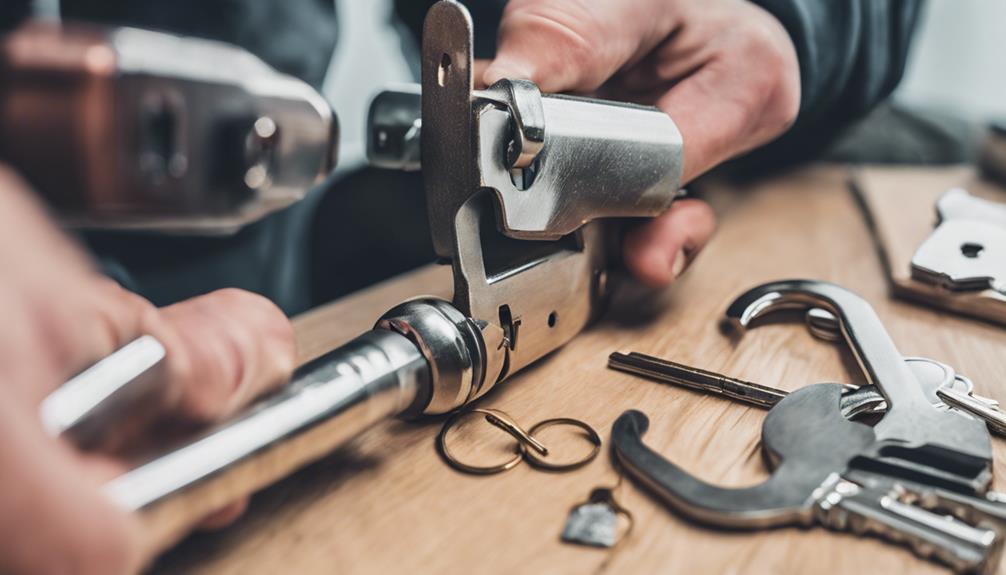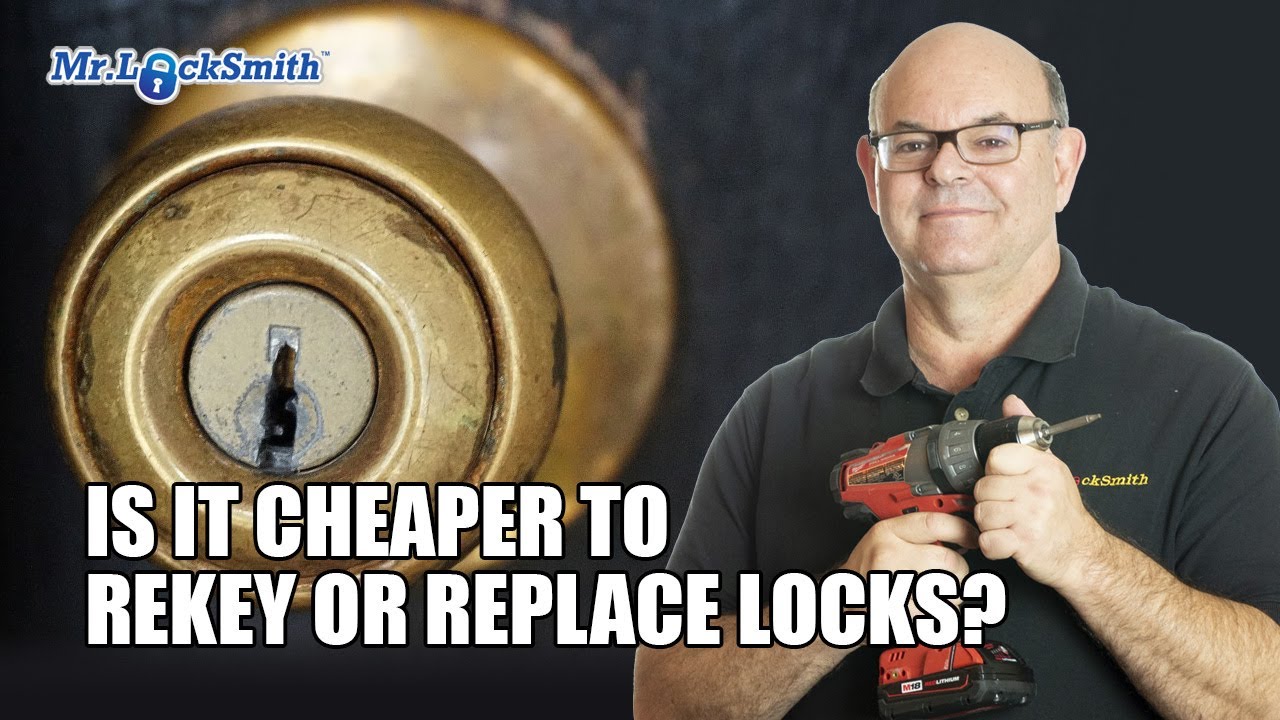When it comes to enhancing security, re-keying and lock replacement offer different advantages. Re-keying is quicker and more cost-effective, ideal for minor security concerns or after moving into a new place. It modifies the existing lock, making old keys useless. However, if your lock's mechanisms are worn or you face a security breach, lock replacement guarantees no access from former keys and introduces modern security features. While re-keying is efficient, replacement provides a more robust defense. Understanding the nuances of each option will help you make informed choices for your security.
Key Takeaways
- Re-keying is a cost-effective solution for enhancing security by changing internal lock mechanisms without replacing the entire lock.
- Lock replacement provides a higher level of security, ensuring old keys cannot access the property and utilizing modern locking technologies.
- Re-keying is ideal for minor security concerns, like after moving in or losing keys, while replacement is necessary after significant security breaches.
- Regular maintenance of locks can extend their lifespan, but worn-out mechanisms may require immediate replacement to ensure safety.
- Professional installation is crucial for both options, ensuring optimal security and functionality of the locking system.
Understanding Re-keying
Re-keying is often the preferred choice for many homeowners looking to enhance their security without the expense of a full lock replacement.
It's a practical solution that allows you to maintain your existing locks while changing the key that operates them. When considering security rekeying vs replacement, you'll find that rekeying is often quicker and more cost-effective, especially if your current locks are still in good condition.
With lock security rekey vs replace, you're not just saving money; you're also minimizing disruption in your home. This process involves adjusting the internal pins of your locks to work with a new key, making old keys useless.
If you've recently moved or lost a key, high-security lock rekeying can be an excellent way to guarantee peace of mind without the hassle of replacing your locks entirely.
Ultimately, re-keying gives you flexibility and security, allowing you to serve your needs efficiently.
Understanding Lock Replacement
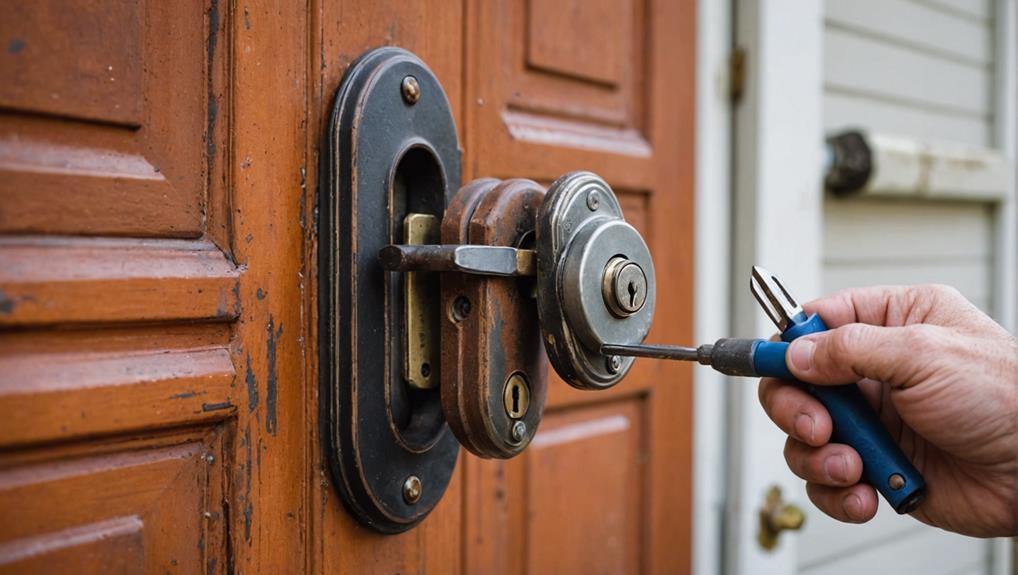
When it comes to securing your home, sometimes replacing the entire lock is the best option. While rekeying can improve your security to some degree, a secure lock replacement provides a higher level of protection. If you've experienced a break-in, lost your keys, or simply wish to upgrade your security, replacing the lock is a proactive step.
A new lock not only guarantees that old keys can't access your home, but it also gives you peace of mind knowing you're using the latest technology. Modern locks are designed with advanced features that deter intruders, making them a wise investment for your safety.
When considering lock replacement, you should choose high-quality locks that meet industry standards. It's also wise to consult with a locksmith who understands the security needs of your home. They can guide you in selecting the right lock and confirming it's installed correctly.
Ultimately, while rekeying offers some benefits, a secure lock replacement can greatly improve your home's security and protect what matters most.
Your safety is paramount, and taking this step shows your commitment to safeguarding your loved ones.
Security Benefits of Re-keying
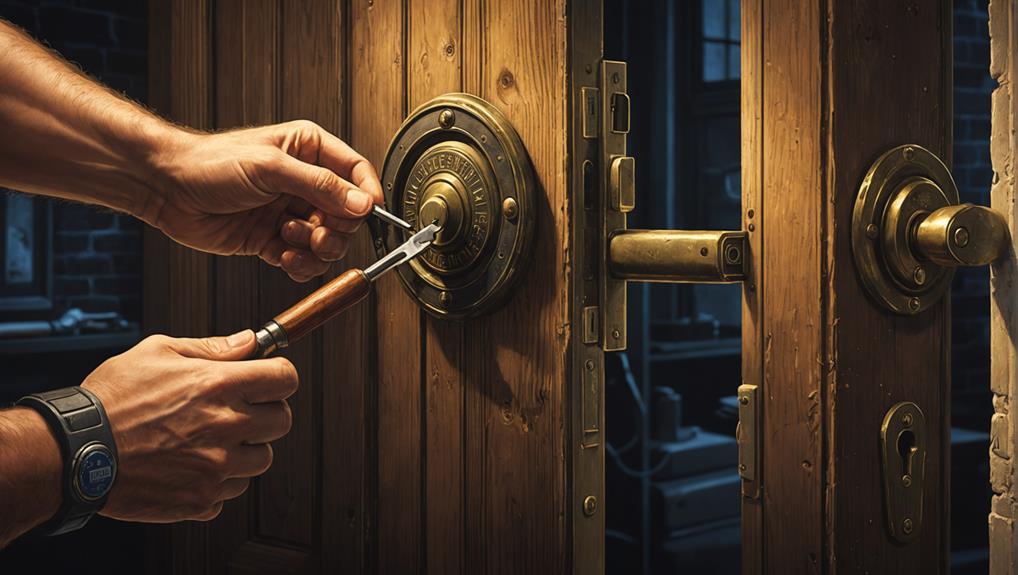
After moving into a new home or losing your keys, re-keying can be an effective way to enhance your security without the expense of a full lock replacement.
In fact, the advantages of re-keying locks include not only cost savings but also increased safety. When you re-key, you're fundamentally changing the internal mechanism of your locks, ensuring that old keys no longer work. This process gives you peace of mind, knowing that previous tenants or anyone who might've found your lost keys can't access your home anymore.
Re-keying is also a quick and convenient solution. Unlike lock replacement, which often requires you to wait for new locks to be installed, re-keying can usually be done on the spot by a professional locksmith. This means you can secure your home almost immediately after a key loss or move-in.
Moreover, re-keying is an eco-friendly option. Instead of discarding old locks, you're simply modifying what you already have, reducing waste.
Security Benefits of Lock Replacement
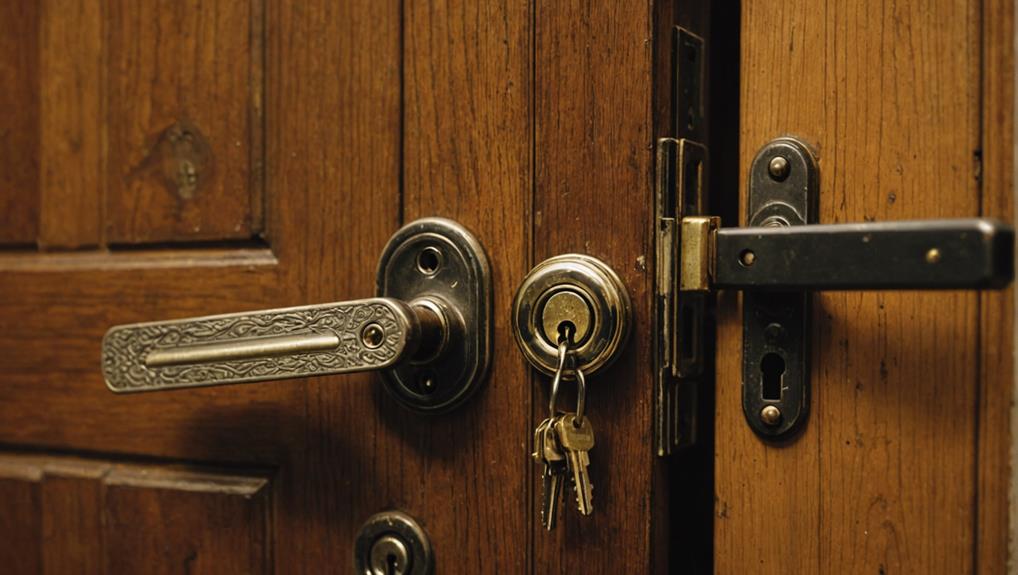
How secure do you feel with your current locks? If you're uncertain, replacing them could greatly boost your security. When you opt for lock replacement, you're ensuring that no unauthorized keys exist. This is especially essential if you've recently moved, experienced a security breach, or lent out your keys frequently.
Essential lock replacement is important for maintaining business security and safeguarding assets.
New locks offer enhanced technology, such as anti-picking features or smart locking systems. These advancements not only deter potential intruders but also provide peace of mind for you and those you care about.
By investing in lock replacement, you're taking a proactive step in safeguarding your home or business, demonstrating your commitment to security for yourself and your community.
Moreover, replacing old locks can eliminate vulnerabilities that come with wear and tear over time. It's an opportunity to upgrade to more durable materials that withstand tampering.
As you consider how to best protect your loved ones and property, remember that lock replacement is a foundational aspect of any security strategy. It's not just about changing a lock; it's about creating a secure environment where everyone can feel safe and protected.
Cost Considerations
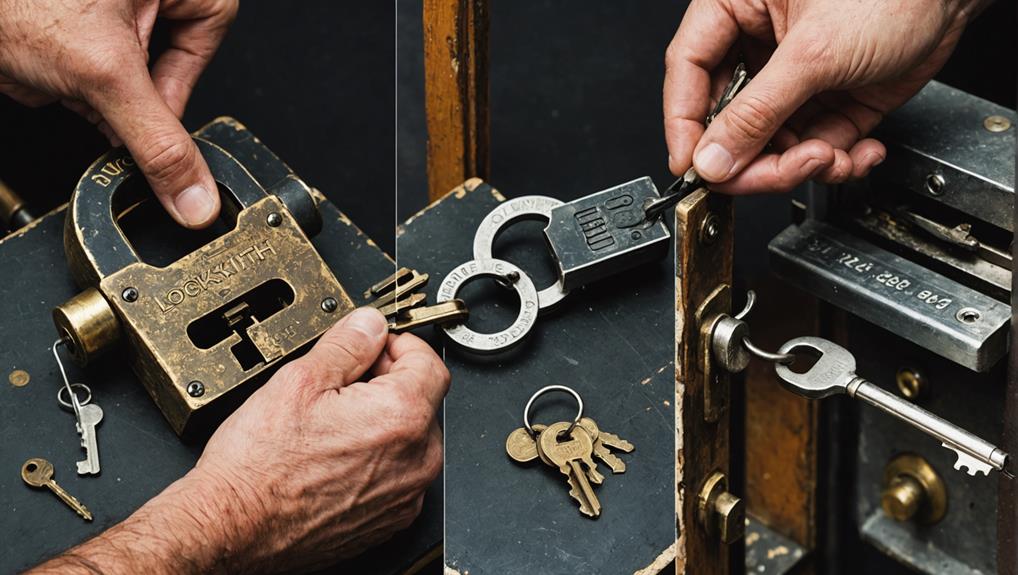
Evaluating the costs involved is essential when deciding between re-keying and lock replacement. You'll find that re-keying is generally more affordable. It often requires only the locksmith's labor and the cost of new keys, making it a quick and budget-friendly option.
Additionally, understanding lock re-keying costs can help you make an informed choice. If you're working with a tight budget, re-keying can serve as a practical solution to enhance security without breaking the bank.
On the other hand, lock replacement can be considerably more expensive. Not only do you need to purchase a new lock, but you'll also need to take into account the installation costs. Depending on the lock type and your property's requirements, this can add up quickly.
However, while initial costs are important, think about the long-term value. A high-quality lock replacement might save you money down the road by reducing the need for future security upgrades.
Ultimately, evaluating your specific situation will guide your decision. Balancing cost with the level of security you want to provide is key to serving your community effectively, ensuring that you're making a choice that benefits everyone involved.
Situations for Re-keying
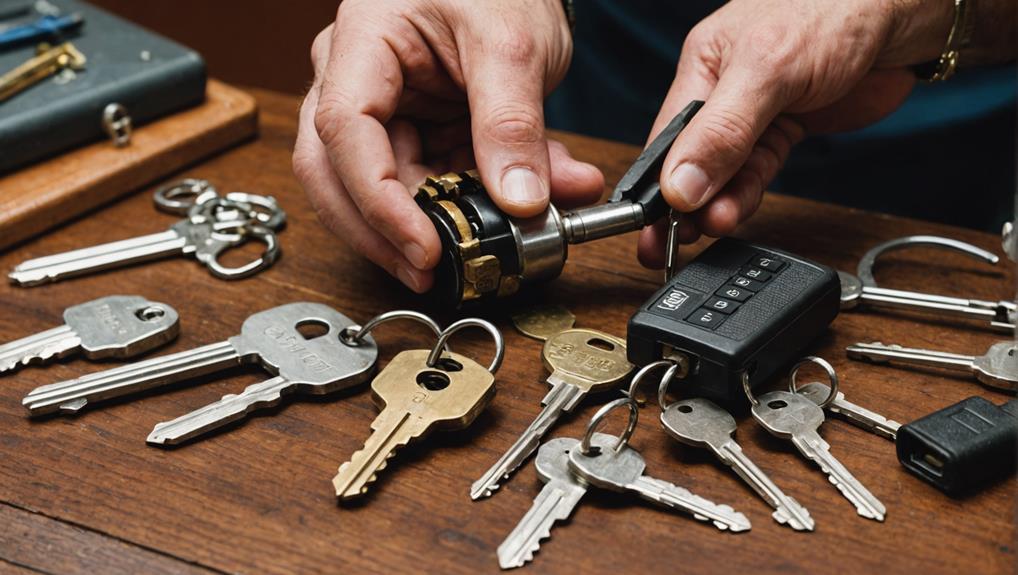
When it comes to enhancing your security, there are specific situations where re-keying is the most practical choice. If you've recently moved into a new home or office, re-keying your locks is essential. You never know who might've copies of the old keys, and ensuring only you have access helps safeguard your space.
In fact, understanding the importance of re-keying can notably contribute to your overall home security the importance of re-keying.
Another situation arises when you've lost your keys. Instead of worrying about someone finding them, re-keying provides peace of mind. This way, you won't have to replace the entire lock, saving you time and money.
If you've had a falling out with a roommate or tenant, re-keying can prevent unauthorized access. It's a quick way to maintain control over who can enter your shared space without the hassle of changing the entire locking system.
Additionally, if your keys have become worn or damaged, re-keying can restore their effectiveness. You'll enjoy smooth operation without the need for a full lock replacement.
In these scenarios, re-keying proves to be a smart, efficient solution for enhancing security while serving your needs and protecting your community.
Situations for Lock Replacement
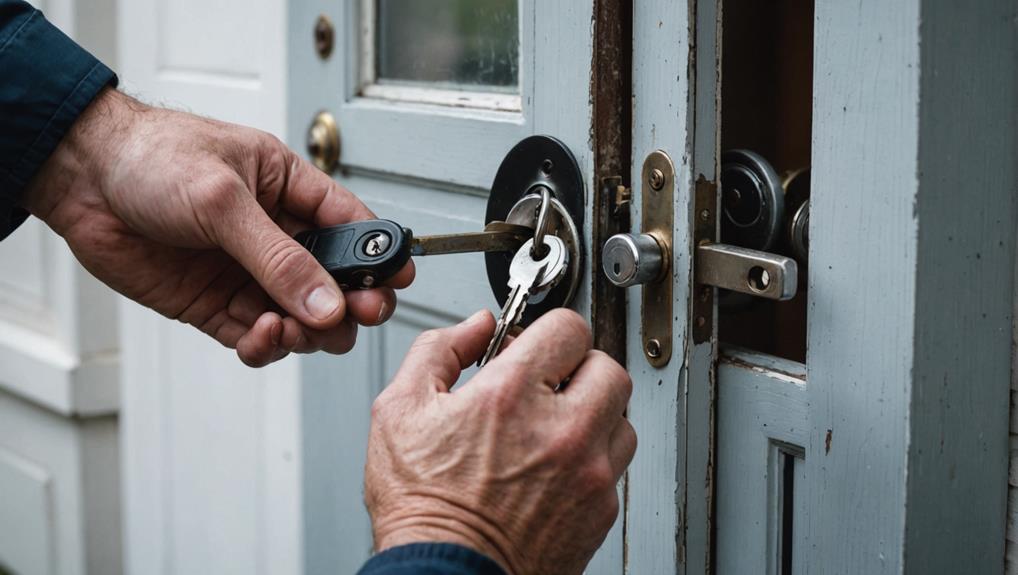
Sometimes, replacing your locks is the best option for your security.
If you've experienced a high-security breach, lost your keys, or noticed your lock mechanisms are worn out, it's time to evaluate a replacement.
Understanding lock replacement costs can help you make an informed decision about your options.
These situations can compromise your safety, and addressing them promptly is essential.
High-Security Breaches
In the wake of a high-security breach, it is vital to evaluate your lock system thoroughly. When sensitive information or valuable assets are compromised, re-keying may not suffice. You should consider a complete lock replacement to guarantee maximum security for your community or organization.
Here's a quick comparison of signs that indicate you might need a lock replacement:
| Indication | Action |
|---|---|
| Compromised Lock | Replace Immediately |
| Repeated Break-ins | Upgrade Lock System |
| Outdated Technology | Install Modern Locks |
If you've experienced a breach, it is important to act swiftly. A compromised lock can lead to further vulnerabilities, putting your organization and those you serve at risk. Replacing locks with high-security options not only restores safety but also helps rebuild trust within your community.
Consider consulting a professional locksmith to assess your situation. They can guide you in selecting the best replacement solutions tailored to your needs. Remember, prioritizing security is an act of service to those around you, guaranteeing their safety and peace of mind.
Lost or Stolen Keys
Losing your keys or having them stolen can leave you feeling vulnerable and anxious about your security. In these situations, you must act quickly to guarantee your safety and the safety of others.
While re-keying could be an option, replacing the lock might be the most prudent choice, especially if you can't account for who might've accessed your keys.
When you replace the lock, you gain peace of mind, knowing that no unauthorized individuals can enter your space. This is especially important if you're serving others, whether they're family, friends, or clients. You want to create an environment where everyone feels secure.
Additionally, consider the number of keys you'd and who'd access to them. If you'd multiple copies floating around, replacing the lock is more sensible than just re-keying. It's about protecting not just your property, but also the trust others place in you.
Ultimately, replacing a lock after losing keys or experiencing theft isn't just about maintaining security; it's about fostering a safe space for everyone connected to you. Make the choice that best protects those you serve.
Worn-Out Lock Mechanisms
When your lock starts showing signs of wear, such as difficulty turning the key or a loose handle, it's crucial to contemplate a replacement. Ignoring these signs can lead to compromised security, making your home vulnerable. By being proactive, you guarantee the safety of your loved ones and possessions.
Here are some indicators that it's time for a lock replacement:
| Sign | Implication | Action |
|---|---|---|
| Difficulty turning key | Internal mechanisms may be failing | Consider replacement |
| Loose handle | Can indicate wear, affecting security | Evaluate for replacement |
| Rust or corrosion | Affects functionality and security | Replace immediately |
| Key sticking | Possible internal damage or misalignment | Inspect and replace |
Tips for Maximizing Security
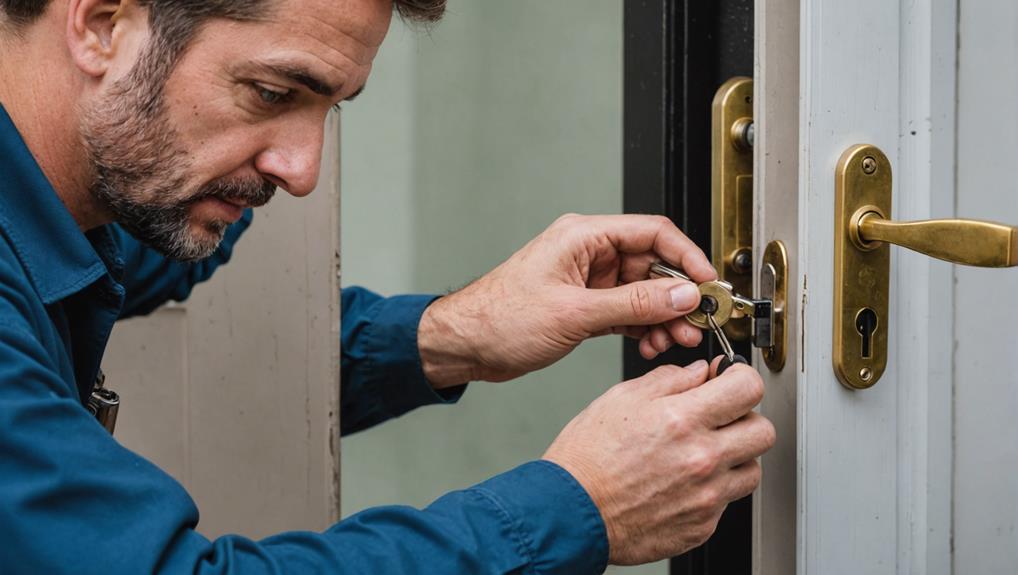
To maximize your security, it's vital to keep up with regular lock maintenance practices and consider high-security options tailored to your needs.
Understanding the advantages of security upgrades can help you make informed decisions when replacing locks.
Don't underestimate the benefits of professional installation, as it can greatly enhance your overall safety.
Regular Lock Maintenance Practices
How often do you think about the importance of regular lock maintenance?
Keeping your locks in top shape not only enhances security but also extends their lifespan. By dedicating just a little time to maintenance, you can guarantee that your locks function smoothly and protect your space effectively.
Here are three essential practices you can adopt:
- Lubricate regularly: Use a graphite or silicone-based lubricant to keep your locks operating smoothly. Avoid oil-based lubricants as they can attract dirt and grime.
- Inspect for wear and tear: Regularly check your locks for signs of damage or rust. If you notice any issues, address them immediately to prevent further deterioration.
- Test your keys: Make sure your keys turn smoothly in the locks. If you encounter resistance, it might be time to re-key or replace the lock to maintain security.
Choosing High-Security Options
In today's world, enhancing your security is more important than ever. Choosing high-security options for your locks can greatly impact your peace of mind and the safety of those you care about.
Start by selecting locks that feature advanced technologies, such as pick-resistant designs and drill-resistant materials. These locks are engineered to withstand tampering and can deter potential intruders.
Consider investing in smart locks, which offer an extra layer of security. These devices often come with features like remote access, alerts, and keyless entry, allowing you to monitor who enters your home.
It's also wise to opt for locks certified by reputable security organizations, as these products undergo rigorous testing to meet high standards.
Don't forget about your surrounding environment. Reinforce doors and windows with solid materials and install security cameras to provide additional layers of protection.
When choosing high-security options, think about your individual needs and the specific vulnerabilities of your property. By taking these steps, you not only protect your home but also create a safer environment for your loved ones and the community you serve.
Professional Installation Benefits
Investing in high-security locks is just the first step toward a safer home. To truly enhance your security, you should consider professional installation. Here's how it can make a significant difference:
- Expert Knowledge: Professionals understand the nuances of different locks and can verify they're installed correctly for ideal security.
- Time Savings: Installing locks can be time-consuming and complex. By hiring a pro, you free up your time for other important tasks, like serving your community.
- Warranty Protection: Many professional installations come with warranties, giving you peace of mind knowing that any issues will be promptly addressed.
When professionals handle your lock installation, you can trust that they'll adhere to industry standards and best practices. This not only enhances the effectiveness of your locks but also adds an extra layer of reassurance for you and your loved ones.
Supporting skilled tradespeople benefits your community, too. By investing in their services, you're contributing to a safer environment for everyone.
Choosing the Right Option
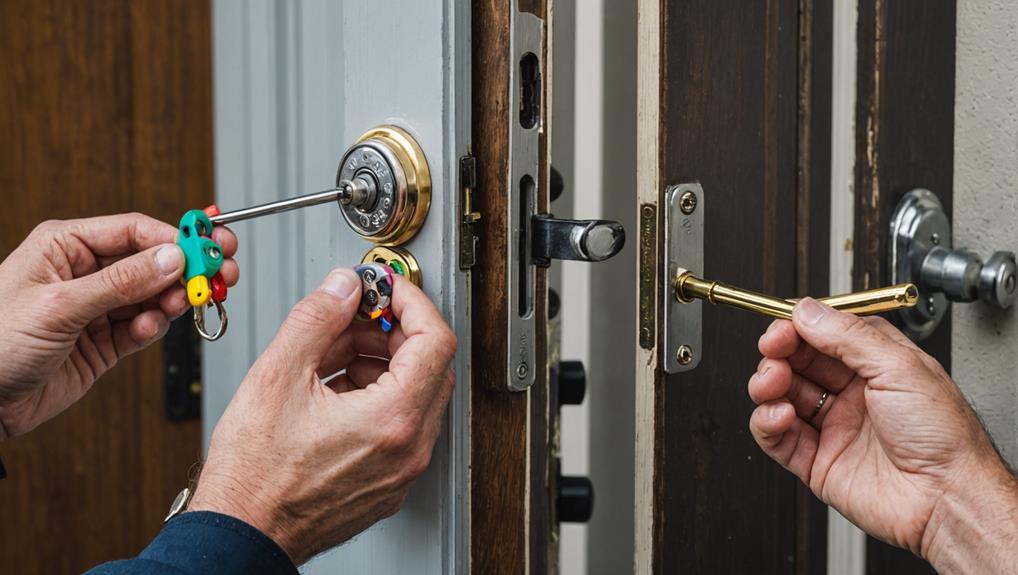
When considering whether to re-key or replace your locks, it's crucial to weigh your options carefully. Each choice has its unique benefits, and understanding them will help you serve your community better by guaranteeing safety and security.
| Option | Pros | Cons |
|---|---|---|
| Re-keying | Cost-effective, quicker process | Limited to existing lock quality |
| Lock Replacement | Enhanced security, new technology | Higher cost, longer installation time |
| Both | Flexibility, tailored solutions | Requires more planning and resources |
Re-keying is often the preferred choice for those looking to save money while still enhancing security. It's a fast solution that allows you to maintain your existing locks, which can be ideal in many situations. However, if you're dealing with old or compromised locks, replacing them might be the best route to guarantee safety.
Ultimately, your decision should reflect the needs of your household or organization. Consider the current security situation, budget constraints, and the level of protection you desire. Making the right choice not only secures your premises but also fosters trust in your community.
Frequently Asked Questions
How Long Does the Re-Keying Process Typically Take?
Re-keying typically takes about 15 to 30 minutes, depending on the type of lock and your locksmith's experience.
You'll want to guarantee that the locksmith has the right tools and expertise to make the process smooth.
It's a quick solution when you need to change your keys but keep the same lock.
Can I Re-Key My Locks Myself?
Yes, you can re-key your locks yourself! It's a straightforward process if you have the right tools and a little patience.
Start by purchasing a re-keying kit compatible with your lock type. Follow the instructions carefully, and remember to keep track of the small parts.
This DIY approach not only saves you money but also gives you a sense of accomplishment. Plus, it's a great way to enhance your home's security efficiently.
What Tools Are Needed for Lock Replacement?
To replace locks, you'll need a few essential tools.
Grab a screwdriver, usually a flathead or Phillips, to remove the old lock. A wrench can help with stubborn bolts, while a tape measure guarantees you get the right size for your new lock.
If you're dealing with deadbolts, a drill might come in handy for installation.
Having these tools ready will make your lock replacement process smooth and efficient.
Are There Any Warranties for New Locks?
When you welcome new locks into your home, it's like inviting trusted guardians to protect your space.
Most manufacturers provide warranties for new locks, typically covering defects in materials or workmanship. These warranties can vary, so you'll want to check the specifics before making a purchase.
How Can I Verify a Locksmith's Credentials?
To verify a locksmith's credentials, start by checking their license and insurance.
You can look for reviews online or ask for recommendations from friends or family.
It's also a good idea to confirm their membership in professional organizations, as these often require certain standards.
When you meet them, trust your instincts—ask questions about their experience and services to ascertain you're making the right choice for your needs.
Conclusion
When deciding between re-keying and lock replacement, think of your security like a garden. Re-keying is like pruning; it keeps your existing plants healthy and secure. Lock replacement, however, is like planting new seeds for a fresh start. In a study, 60% of break-ins involved old locks, showing that sometimes, starting anew is your best defense. Ultimately, choose the option that best fits your needs, ensuring your security garden flourishes for years to come.

